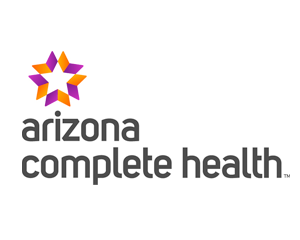Programs, research, and education to build healthier communities
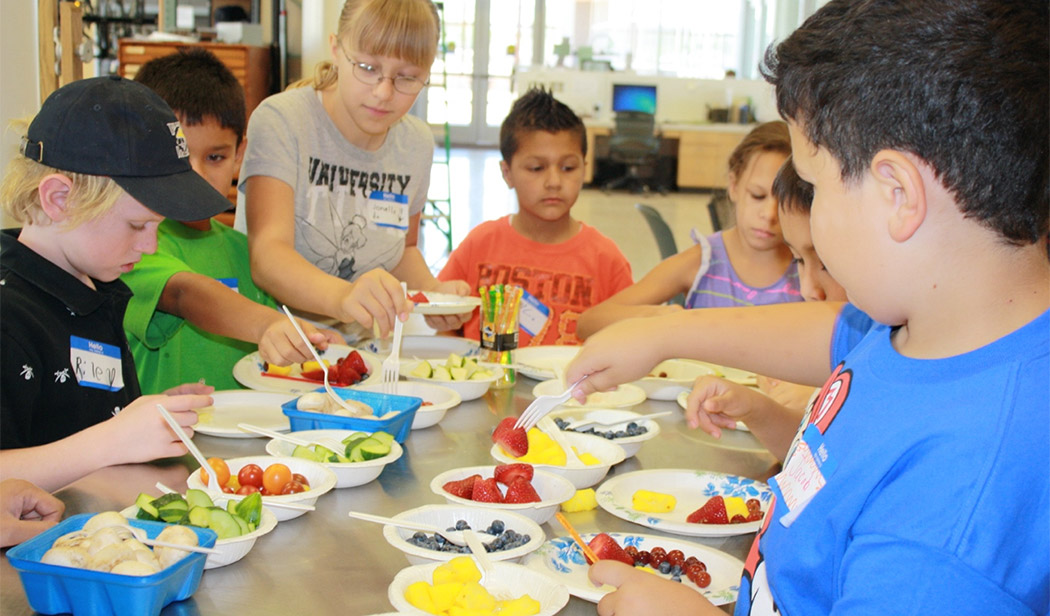
Public health students deliver health education programs to the community
Good public health builds strong communities, and strong communities are healthier communities. So many of the benefits of public health are implemented at the community level, and long term community relationships are at the core of the best public health promotion and practice. The Mel and Enid Zukerman College of Public Health nurtures those relationships in so many ways, and in the stories we tell for the “20 Days for 20 Years” celebration of the 20th Anniversary of the College, you will see countless examples of community engagement and partnership.
For Community Impact Day we are highlighting the work of key centers within the College that do exceptional work with communities around Arizona and beyond.
The Canyon Ranch Center for Prevention and Health promotion (CRCPHP) delivers a host of programs that benefit the health of individuals and communities.
To measure and mitigate the effects of harmful environmental exposure and threats, the Environment, Exposure Science, and Risk Assessment Center (ESRAC), brings hard science and laboratory expertise to evaluate risks for communities and work with local and business partners to find solutions.
To improve public health practice and prevention programs in communities around the entire Western region of the United States, the federally funded Western Region Public Health Training Center (WRPHTC) provides online and in-person training for healthcare service providers, so they can deliver the best public health practices and programs in their own communities.
Community engagement is a key part of public health education at the College, and all students participate our internship program that brings them out of the classroom and into research and practice of public health.
All together, these centers make a big difference in the health and wellness of people around Arizona and the nation, all part of our mission to improve health equity for all communities. Today, we honor and celebrate the work of these centers and their teams of public health professionals.
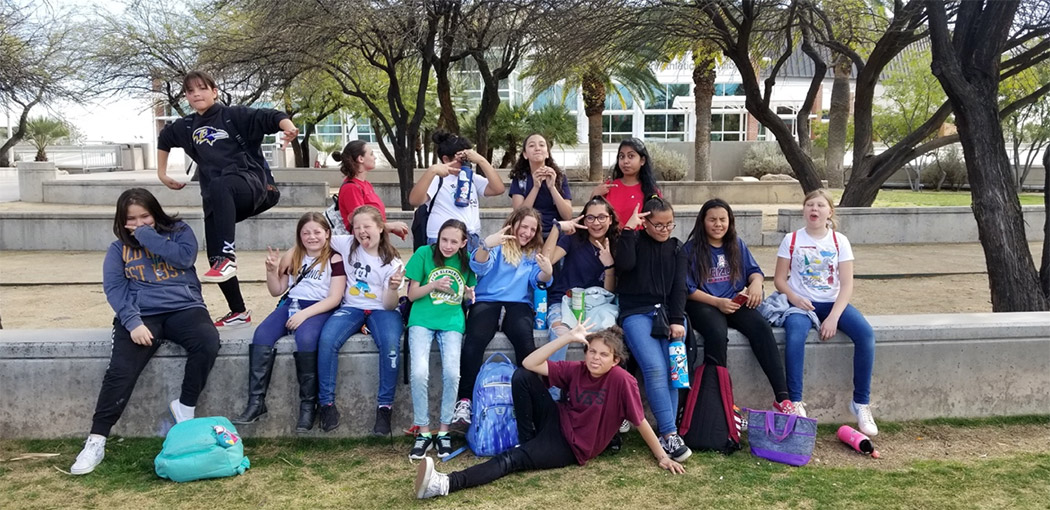
Students in the "Growing Girls" health education program provided by the Canyon Ranch Center for Prevention and Health Promotion
The Canyon Ranch Center for Prevention & Health Promotion
Founded in 2004, the Canyon Ranch Center for Prevention & Health Promotion (CRCPHP) supports many health promotion programs for the Tucson community, and continues to expand it programs and research. Originally funded by the Zuckerman Family (founders of the Canyon Ranch Wellness Resort in Tucson) the Center will soon be renamed the Zuckerman Family Center for Prevention and Health Promotion (ZFCPHP) to honor the extraordinary contribution from the Zuckerman family to support health promotion for youth and families in Tucson and Southern Arizona.

Dr. Cynthia Thomson
Cynthia Thomson, PhD, RD, Director of CRCPHP, guides the center to focus on the benefits of good nutrition, exercise, and the long-term benefits of healthy living. Since 2004, programs from CRCPHP have served several thousand people in the Tucson community to promote lifestyle behavior changes and health education for youth. This includes over 3,200 participants in the Tucson Marathon Family Fitness Fest from 2012-2016 and nearly 400 local youth participants through the Healthy 2B Me Camp. In addition, staff from the Canyon Ranch Center for Prevention & Health Promotion have participated in many local community outreach fairs and events, including the University of Arizona Chinese Cultural fairs and the annual South Tucson Healthy Habits health fair.
The Canyon Ranch Center for Prevention & Health Promotion grew out of the Arizona Prevention Center, propelled by Mel Zuckerman’s vision to support health promotion as a major area of outreach for the College of Public Health. CRCPHP has gone beyond expectations in service to this health promotion mission.

Health 2B Me campers make some moves
CRCPHP operates seven programs per year as well as two community based service-learning courses for undergraduate and graduate public health students. Longstanding programs at CRCPHP include service learning and summer camps targeted to vulnerable youth in Pima County. The Healthy 2B Me Camp has been providing free health-related summer camp sessions to Tucson families for seven years. This summer, the Canyon Ranch Center for Prevention & Health Promotion adapted to the COVID-19 pandemic and delivered the Healthy2BMe Camp, remotely, to 55 Tucson youth and utilized a novel idea, “Camp-in-a-Box" in order to bring camp to these kids. Please take a look at the full story here.
Undergraduate and graduate students at the College also participate in service-learning courses to deliver programs like Project Healthy Schools at St. Peter & Paul Catholic School (part of the Childhood Obesity Prevention Initiative), and a student-led wellness-related curriculum at Las Abuelitas after school center in South Tucson.
Learn more about CRCPHP here: https://crcphp.arizona.edu
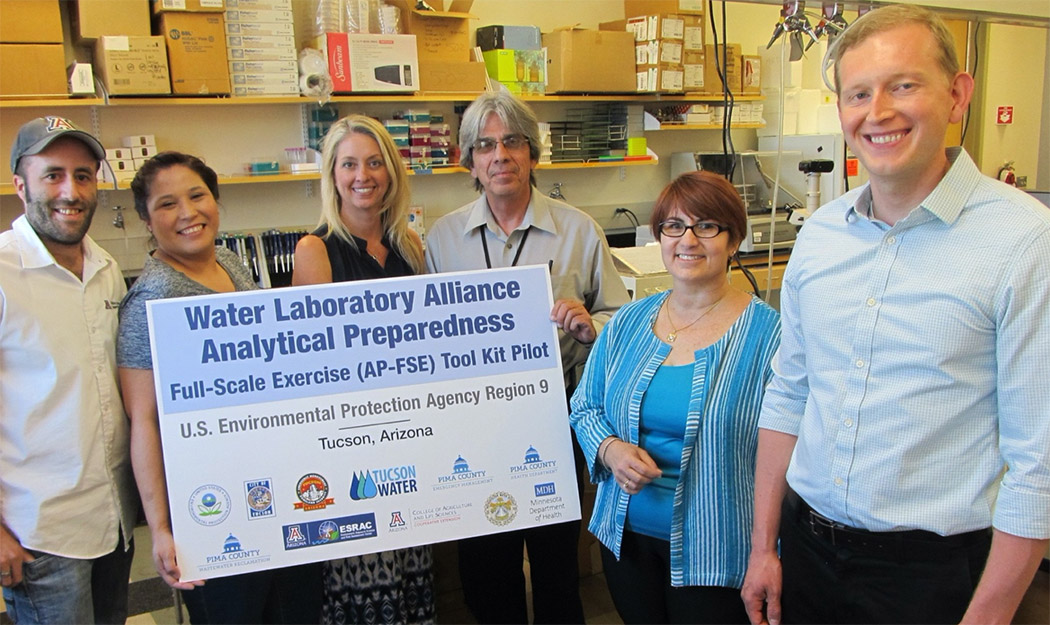
The ESRAC team in the lab, 2016
The Environment, Exposure Science & Risk Assessment Center
The Environment, Exposure Science & Risk Assessment Center (ESRAC) was founded in 2013 by Kelly Reynolds, PhD, Mary Kay O’Rourke, PhD, and Leslie Dennis, PhD to bring scientific analysis and assessment that would meet community needs.
ESRAC’s mission is to provide expertise to industry, the community, and researchers in the areas of human exposure to hazards in the environment. These include a variety of chemical, biological, and physical hazards we come into contact with throughout our daily lives that can impact our health at home, in the workplace, and within our communities.
The current Director of ESRAC, Dr. Kelly Reynolds, guides the Center and its many projects while Dr. O’Rourke, Dr. Dennis and Marc Verhougstraete, PhD, are current co-directors. Jonathan Sexton, PhD, MS, serves as a Research Specialist, Senior and the K-12 Outreach Coordinator for ESRAC. Collaborating members come from the University of Arizona Colleges of Public Health, Agriculture, Medicine, and Engineering.
One primary area of research includes tracking and preventing healthcare-acquired infections which cause approximately 100,000 deaths every year in the U.S. The approach promotes the understanding of environmental exposures in the context of human health and safety through hazard identification, monitoring and modeling of exposures, evaluating the impacts of intervention and mitigation strategies on health outcomes, and quantifying the economic impact of these exposures.
ESRAC investigators use a team approach to leverage the strengths of experts across different fields, including microbiology, medicine, epidemiology, public health, and mathematical modeling. This collective knowledge is needed to solve the complex issues of today where we are exposed to a multitude of potentially hazardous compounds present in the environment – including our food, water, and air. These findings inform policy initiatives, direct technology development, educate communities, and prioritize public health projects.
Dr. Kelly Reynolds extends her gratitude to the donors who helped to make ESRAC possible and support the College’s “One Health” program in this video.
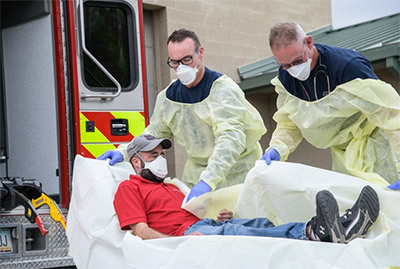
The ESRAC team works with the Tucson Fire Department
on a training video for COVID-19 response
Supporting First Responders
ESRAC has also helped develop multiple training programs for first responders, including the Tucson Fire Department, Tucson Police Department, and various healthcare delivery professionals.
In collaboration with the Tucson Fire Department (TFD) and the Western Regional Public Health Training Center (WRPHTC) at MEZCOPH, ESRAC created a training video for firefighters and EMS responders about the best protocols to avoid infection during the COVID-19 pandemic. This training video has received more than 20,000 views on YouTube.
National Impact
In another highlight, ESRAC, in collaboration with the Western Region Public Health Training Center, CDC, National Network of Public Health Institutes, and an advisory team developed a free online training program on creating a water management program to reduce the risk for Legionnaires’ disease. More than 1,000 participants have completed the 3-hour interactive training and it was the most popular course offered by the Western Region Public Health Training Center in 2018-2019.
The Center also provided the platform for a team of researchers, led by Dr. Jeong-Yeol Yoon from the UA College of Engineering and Dr. Kelly Reynolds, to develop a smartphone-based field test method to monitor water supplies for human norovirus and other contaminants in 2019. The American Chemical Society (ACS) Omega, recognized this publication as one of the top 50 most outstanding articles to demonstrate the quality of work published over the last 5 years.
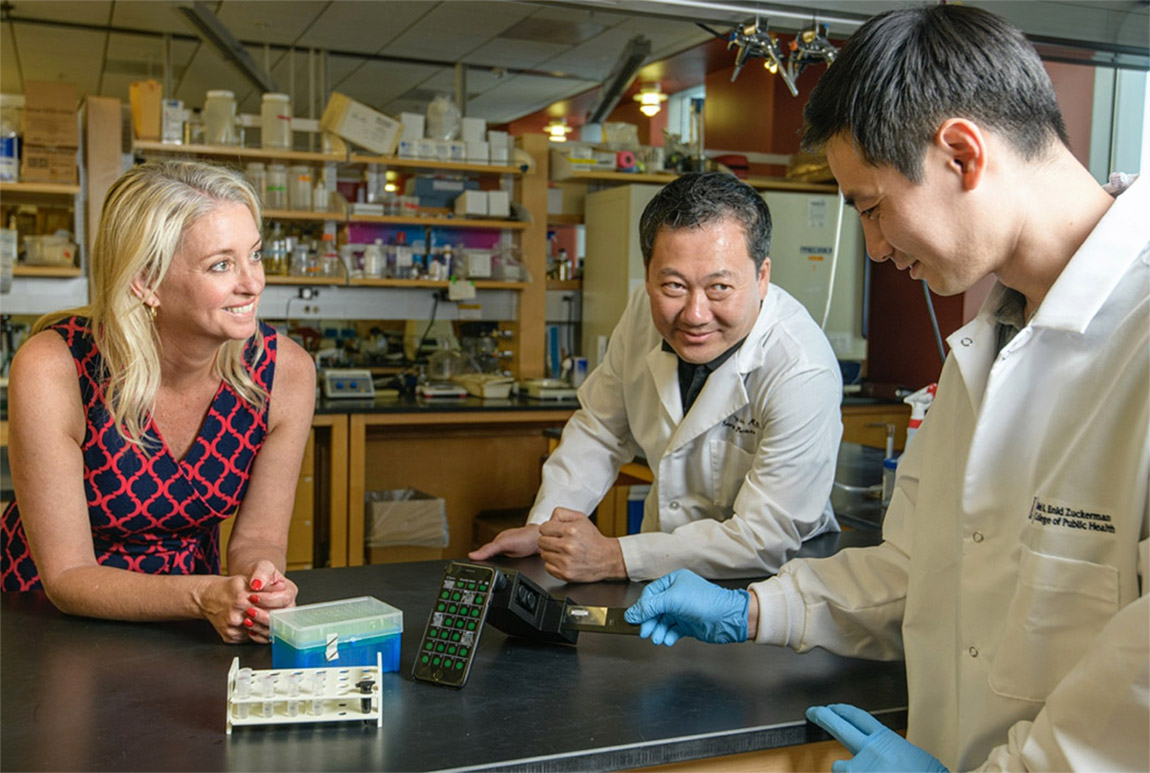
From left: Kelly A. Reynolds, PhD, chair of the Department of Community, Environment and Policy in the Mel & Enid Zuckerman College of Public Health; Jeong-Yeol Yoon, PhD, a researcher in the departments of Biomedical Engineering and Biosystems Engineer
ESRAC continues to provide outstanding service and leadership in exposure science and risk assessment, a vital field in our complex modern world. Their work will provide the data, the guidance, and the tools to keep our communities healthy and informed for a better tomorrow.
Learn more about ESRAC here: https://esrac.arizona.edu
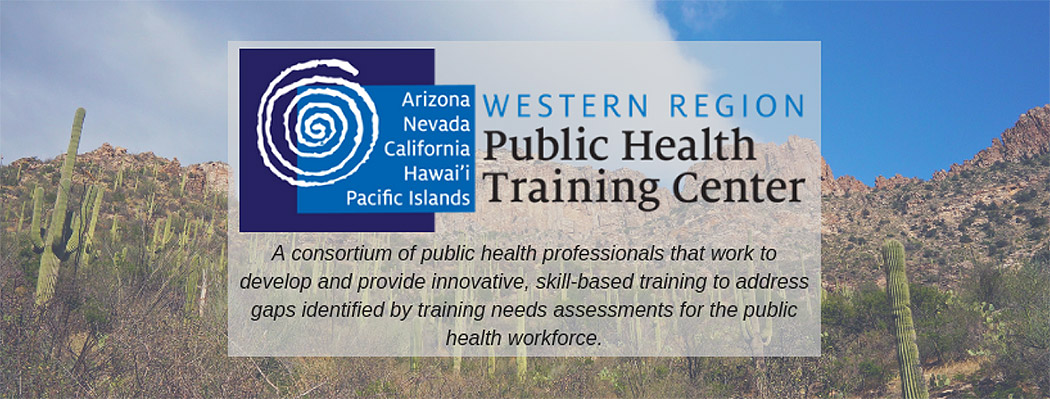
The Western Regional Public Health Training Center
A leader and innovator in continuing public health education, the Western Region Public Health Training Center (WRPHTC) provides training and assessment services for public health professionals and health departments in Arizona, Nevada, California, Hawaii and the US Associated Pacific Islands. In the dynamic world of health services, responsive training based on the current science is essential for a strong public health workforce, and that is what the Training Center delivers to keep our public health workers informed and our communities healthy.
Federally funded by the Health Resources and Service Administration (HRSA), a federal agency under the U.S. Department of Health and Human Services, WRPHTC grew out of the Arizona Public Health Training Center (AzPHTC) and launched in 2014 with an HRSA grant written by Professor Doug Taren, PhD, MS, Director of WRPHTC. The Training Center works in three areas – Training, Needs Assessments and Support 30 Public Health Student Internships – and in the training realm, the WRPHTC provides online courses, face-to-face trainings, virtual conferences and podcasts to deliver up-to-date research and best practices for the public health workforce.
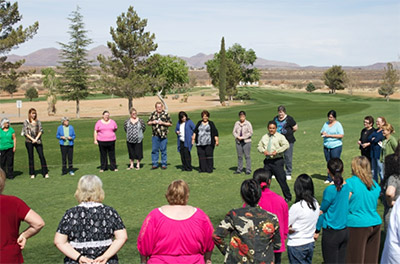
An in-person training program conducted
before the COVID-19 pandemic
Many people who work in public health do not have a public health background and the training from the WRPHTC program allows them to gain essential knowledge about public health and receive continuing education credits for their profession. To address those needs, the Training Center offers courses in cour public health competencies: Analytical/Assessment Skills, Policy Development/Program Planning Skills, Communication Skills, Cultural Competency Skills, Community Dimensions of Practice Skills, Public Health Science Skills, Financial Planning and Management Skills, and Leadership and Systems Thinking Skills. In addition, the WRPHTC also serves health departments by conducting training needs assessments, and competency needs assessments, metrics that health departments require for their accreditation.
Exceptional Collaboration
In 2017, the WRPHTC teamed up with ESRAC and, working with Dr. Kelly Reynolds, received funds from the National Network of Public Health Institutes and the US Centers for Disease Control and Prevention (CDC) developed a free online training program on creating a water management program to reduce the risk for Legionnaires’ disease. More than 1,000 participants have completed the 3-hour interactive training and it was the most popular course offered by the Western Region Public Health Training Center in 2018-2019.
In 2018, building on their success, the WRPHTC again received funding from HRSA for another 4 years of service, with a focus on obesity prevention, a public health response to the opioid epidemic and treating mental health issues. Soon after the new grant award, Abigail Stoica, MPH, an alumna of the Zuckerman College of Public Health, became the associate director of the training center. Stoica has worked to expand the Training Center’s online training channels, lead the development of virtual conferences, produce podcasts, and expand the center’s social media presence, outstanding work that has reached thousands of public health professionals.
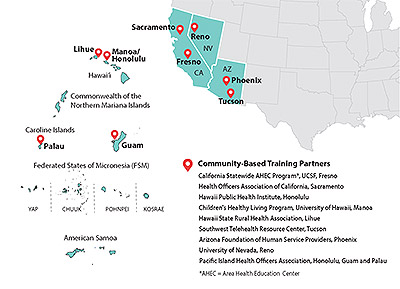
A map of the region served by the WRPHTC
Also in 2018, The WRPHTC teamed up with the College of Nursing and received a funding award from HRSA to create a training program to certify nurses as Sexual Assault Nurse Examiners. The program coordinator, Erica Freese, MPH, is also a graduate from the Zuckerman College of Public Health MPH Program.
Uniquely situated within the UArizona College of Public Health, the Western Region Public Health Training Center has the opportunity to collaborate with many talented faculty from the College who are leaders in research, practice, and health promotion. This partnership brings together a wealth of expertise from the College, in addition to expertise from public health professionals in Arizona and beyond. The WRPHTC team then transforms that expertise into training, so that the entire western region (and others!) benefits from the most current knowledge and practice in the public health sphere. All this adds up to a powerful portfolio of training resources that constantly adapts to meet the health needs of communities and the public health workforce that serves those communities. The WRPHTC makes a tangible impact on the lives of so many Americans as they work towards a healthier tomorrow for all of us.
Learn more about the WRPHTC here: https://wrphtc.arizona.edu
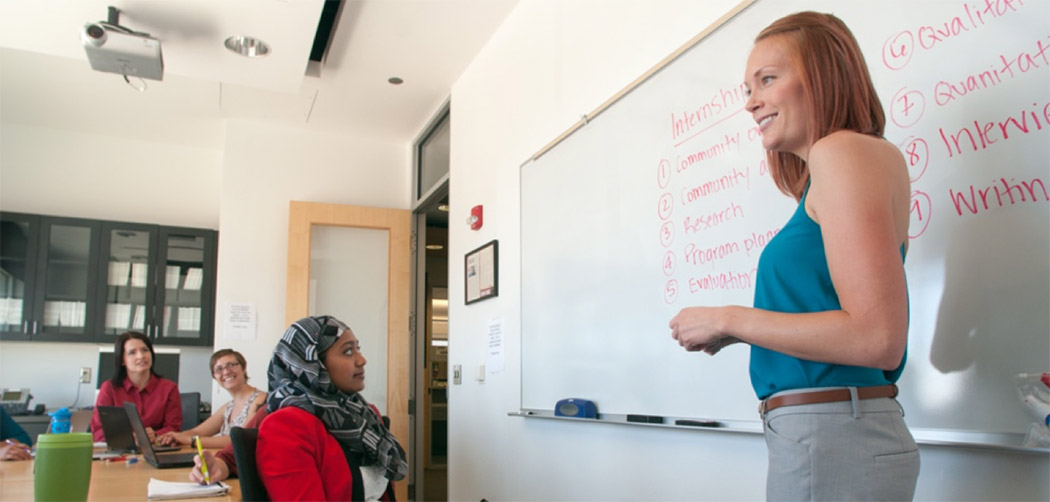
The MEZCOPH Internship Program
At the Mel and Enid Zuckerman College of Public Health, all students are required to complete an internship. Internships connect students with working professionals, with communities, with the organizations that do the work to improve public health in our region and our state. Since the founding of the College, the internship program has been an integral part of the public health student experience, a key component in training the public health leaders of tomorrow.
The internship experience enables students at both the undergraduate and graduate levels to apply the knowledge and skills they have acquired in coursework to a project in a professional practice setting. It is important that the internship experience meets both the learning objectives of the student and the specific needs of the internship site/host organization to build a collaborative experience.
Additionally, the internship experience provides an excellent opportunity for students to obtain applied experience working in the public health field and further clarify their career goals, while serving the surrounding community. Internships might include activities such as planning a new public health program, evaluating an existing program, analyzing data, writing a policy analysis, or implementing strategies for better quality improvement.
Students often complete their internships at county and state health departments, non-profit organizations in the US, NGOs internationally, community-based programs at universities, and even large organizations such as the Centers for Disease Control and Prevention (CDC) or the World Health Organization (WHO). Looking locally, students within the last year have interned at local organization such as at United Way of Tucson and Southern Arizona, the Pima County Health Department, The Collaboratory, UArizona Campus Health, The Colibrí Center for Human Rights, and the Canyon Ranch Center for Prevention and Health Promotion. Many students have also found meaningful internships partnering with our faculty to help conduct a range of public health and COVID-19-related research at the Zuckerman College of Public Health.
Learn more about the Internship Program here: https://publichealth.arizona.edu/undergraduate/internships


